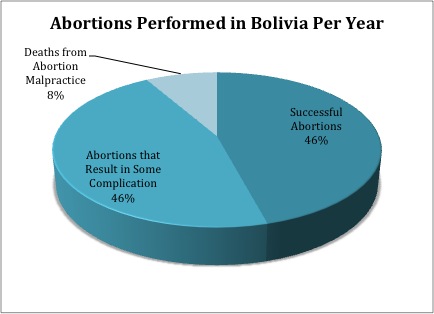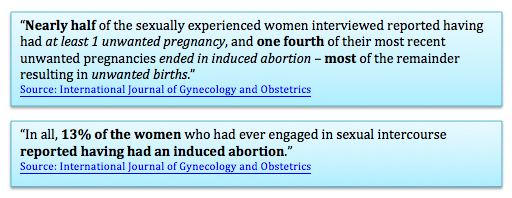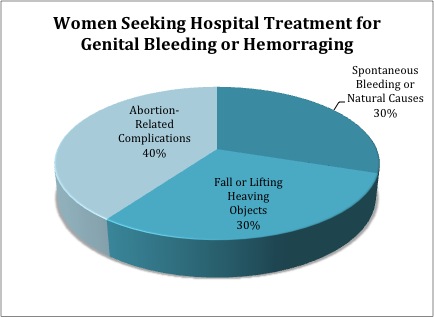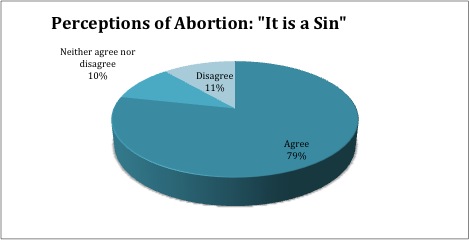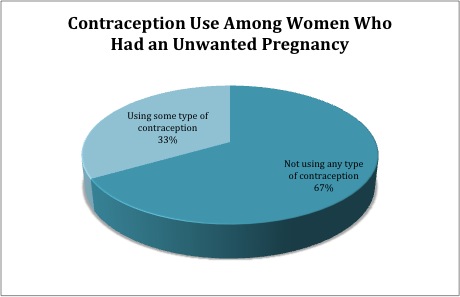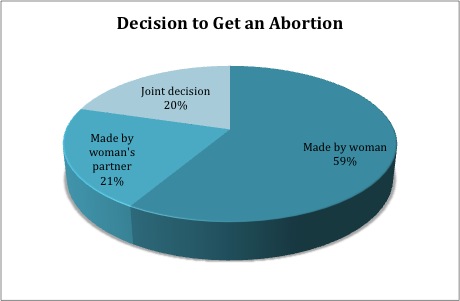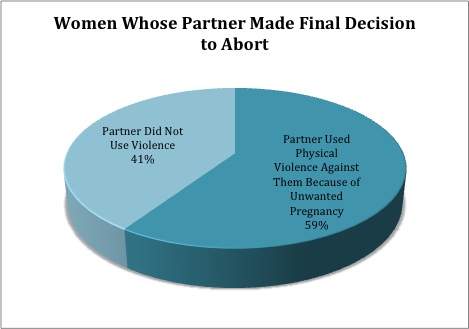Constitutional Tribunal to Rule on Bolivia’s Abortion Prohibition: Religious and Political Debate Eclipses Public Health Crisis
The Bolivian Constitutional Tribunal is considering the constitutionality of the country’s abortion legislation. The emotionally charged and morally focused debate in Bolivia has eclipsed public health crisis of abortion and the risks that Bolivian women face trying to exert control over their bodies. Lack of access to and information about sexual and reproductive health combined with cultural taboos and widespread sexual violence put women’s health at risk and severely limit their choices. Examining data about abortion and sexual and reproductive health provides a fact-based perspective about the health issues and complicated social dynamics surrounding abortion.
Incidence of Abortion in Bolivia
Estimates of how many women abort every year in Bolivia range from 60,000 to 80,000. The following chart is based off of the most conservative estimate:
Abortions Performed in Bolivia Per Year
| Abortions performed in Bolivia per year | 60,000 |
| Abortions that result in some complication | 27,500 |
| Deaths from abortion malpractice | 5,000 |
The following statistics are from a survey carried out by Marie Stopes International Bolivia and the Center of Information and Development of Women of women ages 15-49 in low-income, peri-urban neighborhoods in Sucre, Santa Cruz, Cochabamba, La Paz, and El Alto.
Abortion Legislation
Bolivia’s 2009 constitution guarantees sexual and reproductive rights. As such, advocates for decriminalization have pointed out that the abortion laws in the 1972 criminal code are unconstitutional. On these grounds, an Aymara congresswoman from President Morales’s party (Movement Toward Socialism – MAS) challenged the constitutionality of the abortion laws and other stipulations of the code in the Constitutional Tribunal, which has the final legal say in Bolivia.
Under current Bolivian legislation, abortion is only legal in the following cases, and requires a judges’ consent:
- If the pregnancy was the result of rape, kidnapping (without subsequent marriage), or incest or sexual molestation (but only if legal charges have been pressed).
- If the abortion is indispensable to protect the mother’s life or health[i]
In all other cases, a woman who obtains an abortion can be sentenced to one to three years in prison. The person who causes the death of a fetus can be sentenced to three months to nine years, depending on the circumstances.[ii] The legislation includes disturbing and vague language; for example, if the abortion was committed to “save the honor of the woman,” the person who performed the abortion receives six months to two years, rather than one to three years.
In May 2013, the UN Committee Against Torture stated that the requirement for a court order in these cases “creates an insurmountable impediment for women in this situation, who are forced to resort to illegal abortions, with the accompanying health risk.“
The member State must guarantee that women rape victims who decide to voluntarily end their pregnancies have access to safe abortion attention and must eliminate any unnecessary impediments to this….The Committee urges the member State to evaluate the impact on women’ health of the existing legislation, which is very restrictive on the abortion issue. (p. 10-11)
Abortion “Debate” Within MAS and Overall Society
Although the ruling MAS party is often characterized as a monolithic force, there is no consensus within its leadership on the abortion issue. Morales has not personally supported changes to abortion laws. On July 19th, Morales stated, “Of course we have to discuss this issue. It’s my understanding that any abortion is a crime, but we need to have an official cabinet debate so that the government can define its position…Fortunately, we have a lot of knowledgeable [women] cabinet members with character who can give us a well-argued explanation on this issue.” In contrast, cabinet member Claudia Peña affirmed, “I think that abortion should legal. We also need to strengthen our efforts to give people greater access to information about their sexual and reproductive rights and unlimited access to birth control.”
The loudest voices in Bolivia’s abortion debate appear driven by moralistic and emotional rhetoric. Arguments from those who want to maintain the criminalization of abortion range from declarations of abortion as a sin to assertions that foreign governments and international non-governmental organizations are behind the push to legalize abortions in order to control Bolivia’s population.
Throughout Bolivia, there have been sizeable demonstrations against decriminalization, as well as many demonstrations in favor. In Cochabamba, some parents reported that their children’s schools obliged students to go to the anti-abortion march on August 27th, threatening to fail the child if he or she did not attend. The Catholic University in Cochabamba cancelled classes during the march so that students could attend.
On July 22nd, 2013, the Catholic Archbishop of Santa Cruz claimed that international foundations are promoting population control and the legalization of abortion as well as using their own resources to modify the criminal code. This opinion has also been expressed in editorials and anti-abortion demonstrations. During the demonstration held on August 27th, anti-abortion protesters made many claims, including that the US government is secretly trying to promote abortion in Bolivia to keep the population in countries like Bolivia down.
Although Bolivia is officially a secular state, religion has undoubtedly entered the political debate about abortion. The indigenous leader of MAS’s parliamentary bloc in the lower house of congress, Emiliana Ayza, declared that she believes abortion is “murder that is a sin in the eyes of God.”
Source: International Journal of Gynecology and Obstetrics
More Facts and Figures[iii]
[i] Bolivian Penal Code, Article 266
[ii] Any person who causes the death of a fetus in the womb or its premature removal can be sentenced to three months to nine years, depending on the circumstances: (Bolivia’s Penal Code, Articles 263-269)
- A woman consenting to an abortion or performing an abortion with her consent (1-3 years)
- Failed attempts to abort are not punishable by law
- Accidental abortion (3 months-3 years)
- Abortion performed to protect a woman’s honor (6 months-2 years) and up to 1/3 longer if she dies as a result
- Practitioners who regularly carry out abortions (1-6 years)
- One year of service/work for the a person who provokes an abortion
- One to three years if the abortion was practiced with the consent of the woman
- With the woman’s consent, and resulting in injury (1-4 years); 50% longer if the woman died as a result of the abortion
- Without the consent of the woman, who sustained injuries as a result (1-7 years), if she dies as a result of the abortion (2-9 years)
- Without the woman’s consent or younger than 16 years-old (2-6 years)
- Without the woman’s consent, resulting in her death (2-9 years)
- Physical, psychological, or sexual violence against a woman that causes an abortion— (4-8 years) from new “Comprehensive Law to Guarantee Women a Life Free of Violence,” passed on March 9th, 2013. See AIN’s update on the law.

